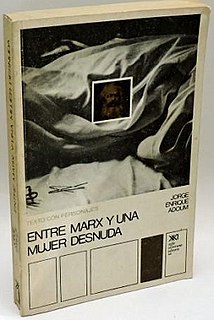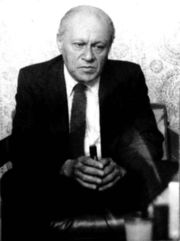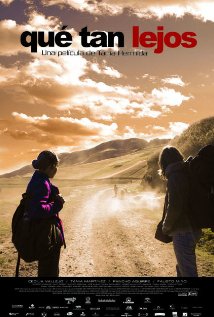The majority of Ecuador's population is descended from a mixture of both European and Amerindian ancestry. The other 10% of Ecuador's population originate east of the Atlantic Ocean, predominantly from Spain, Italy, Lebanon, France and Germany. Around the Esmeraldas and Chota regions, the African influence would be strong among the small population of Afro-Ecuadorians that account for no more than 10%. Close to 80% of Ecuadorians are Roman Catholic, although the indigenous population blend Christian beliefs with ancient indigenous customs.
Ethnic makeup of Ecuador: mestizo 70%, Amerindian 7%, Spanish and others 12%, black 11%.

Jorge Enrique Adoumخورخي انريكي قَدُّوم was an Ecuadorian writer, poet, politician, and diplomat. He was one of the major exponents of Latin American poetry. His work received such prestigious awards as the first Casa de las Américas Prize in Cuba, the most important honor in Latin American letters. Though hailed by Nobel Prize winner Pablo Neruda as the best poet of his generation in Latin America, Adoum’s work is unknown in the English-speaking world.
Camilo Egas was an Ecuadorian master painter and teacher, who was also active in the United States and Europe. Camilo Egas was married in Paris 1927 to Dancer and artist Margarita Gibbons. Camilo Egas museo illustrates a self portrait of the artist of 1946 that is on the cover of a pamphlet published by them then used for a book Jan 2003 edition by del Banco central del Ecuador

Álex Dario Aguinaga Garzón is an Ecuadorian former professional footballer who played as a midfielder. As a player, he is one of the all-time cap leaders for Ecuador with 109 matches, scoring 23 goals. Aguinaga is known as one of the best Ecuadorian footballers of all time. On the club level, Aguinaga has played for Deportivo Quito, Necaxa, Cruz Azul and LDU Quito.

Crónicas ("chronicles") is a 2004 Ecuadorian thriller film, written and directed by Sebastián Cordero. The film was produced by, among others, Guillermo del Toro, director of Pan's Labyrinth, and Alfonso Cuarón, director of Children of Men. It was screened in the Un Certain Regard section at the 2004 Cannes Film Festival.

Entre Marx y una Mujer Desnuda is a 1976 novel written by the Ecuadorian poet Jorge Enrique Adoum.

Camilo Coba is a young filmmaker and photographer from Ecuador.

José de la Cuadra was an Ecuadorian social realist writer, whose short stories are among the most important in Ecuadorian literature.
The cinema of Ecuador has a long history, including both short and feature-length films made throughout the 20th century, but until recently Ecuadorian film has generally not had a large impact.

Demetrio Aguilera Malta was an Ecuadorian writer, director, painter, and diplomat. He was a member of the Guayaquil Group of the 1930s, who used social realism in their writings. He used magical realism in his masterpiece Siete lunas y siete serpientes (1970), which was translated into English as Seven Serpents and Seven Moons by Gregory Rabassa in 1979.

Sabina Berman Goldberg is a writer and journalist. Her work deals mainly with issues related to diversity and its obstacles. She is a four-time winner of the National Playwriting Award in Mexico and has twice won the National Journalism Award. Her plays have been staged in Canada, North America, Latin America, and Europe. Her novel, Me has been translated into 11 languages and published in over 33 countries, including Spain, France, the United States, England, and Israel.

Qué tan lejos is a 2006 film directed by Ecuadorian filmmaker Tania Hermida. The film is a road movie co-produced by Ecuador and Spain, and it stars Tania Martinez and Cecilia Vallejo as an Ecuadorian student and a Spanish tourist, respectively, that met each other in a bus and take rides together when the roads are blocked because of a strike. Hermida had the plot idea in 1997 but only started to produce the film in 2003. Filming was entirely done in Ecuador during 2005, while post-production finished in 2006.

Nela Martínez Espinosa was an Ecuadorian communist, political militant, activist, and writer.

Enchufe.tv is an Ecuadorian web series produced by Touché Films. Based in Quito, Ecuador, it consists of comedic sketches viewed primarily on its YouTube channels as well as on Ecuadorian television channel Ecuavisa.
Galo René Pérez Cruz was an Ecuadorian writer, poet, literary critic, biographer, and college teacher.

Julio Pazos Barrera is a poet, writer, teacher, and cook.

Ulises Estrella Moya was an Ecuadorian poet. He was the co-founder of Tzantzismo, a movement of the 1960s, Ecuador. He was also a film expert, who headed the film department of the House of Ecuadorian Culture for over 30 years.
Juana Guarderas Albuja is an Ecuadorian theatre, cinema, and television actress. She has been the director of the Quito Comedy Club since 1990.
Juan Valdano Morejón is an Ecuadorian writer. He was born in Cuenca in 1939. He studied at the University of Cuenca, Complutense University of Madrid and the University of Aix-en-Provence. He taught literature and literary theory at the University of Cuenca and at the Pontificia Universidad Católica del Ecuador.













